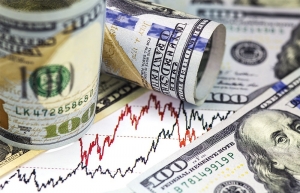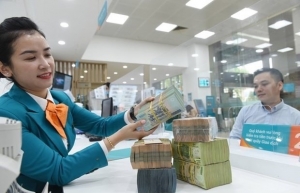Gauging interest rate moves through expert lens
The State Bank of Vietnam (SBV) raised the operating interest rate in the last months of 2022. Do you think this decision was made to control inflation or stabilise the forex market, or both?
 |
| Peter Verhoeven, chairman of Prometheus Asia |
The SBV, like other central banks, has multiple purposes and roles to perform. Monetary policy is a key responsibility as it controls the amount of money available in the market. By increasing the amount of money in circulation, there is upward pressure on pricing and inflation, and vice versa.
For central banks like the SBV, this is a fine balancing act. With a 2 per cent annual inflation rate, according to most economists, there is enough money available for businesses and individuals to make purchases and investments. When the inflation rate goes higher, like it did in most countries in 2022 as a result of government stimulus programmes, central banks increase the rate they charge banks to borrow from them.
This makes lending more expensive and reduces the amount of money in circulation, with the hope for downward pressure on inflation. The foreign exchange rate is impacted by the interest rate differential, as money will flow from a currency with low interest rates to a country with higher interest rates as investors chase returns. Selling the low interest currency and buying the high rate currency cause the low currency to drop in value compared to the high currency.
Given the gradually increasing inflation rate in Vietnam, which is significantly lower than in the US, UK, and EU, I believe that the SBV raised the interest rate to control inflation, with the added benefit of stabilising the foreign exchange rate. It was the right thing to do, showing that it has been on top of the situation.
How do you perceive the SBV’s recent move in March to twice reduce operating interest rates in the context of global instability, at a time when the banking industry in the US and Europe may be suffering from a lack of confidence?
The inflation rate in Vietnam has not been as high as in many other countries, and much of it caused by push inflation such as commodities pricing, and transportation. Moreover, it has been gradually decreasing. Any increase in interest rates makes it more expensive to borrow for individuals and companies, yet more attractive to save.
With higher interest rates, there is less investment and, as a result, this slows growth. The SBV has to balance the need to control inflation, which I believe they have been doing quite well, with the need to promote economic growth.
Inflation numbers, relatively low comparatively, are coming down and as such, I believe that reducing the interest rate is probably a good decision to spur growth. We will see the outcome in six months or so.
Central banks around the world are continuing to deal with inflation, but Vietnam’s inflation is dropping gradually in the first quarter of 2023. Is this an opportunity for interest rates in Vietnam to fall sharply in the near future?
I don’t believe that we will see inflation and interest rates fall sharply anywhere in the world. As inflation continues to decrease, hopefully, in Vietnam I believe that we will see a gradual easing of interest rates. No big movements. Nothing like the shock treatment of multiple 0.75 per cent increases by the US Federal Reserve.
Given the stubborn inflation rates in the US, UK, and EU, as well as many other countries, I don’t see any easing in those markets. With high commodities costs, wage pressures, and other push factors, inflation is proving tough to bring down.
Central banks around the world are continuing to focus on reducing the inflation rate in their markets, and I am confident that the SBV is no different. That said, Vietnam’s inflation is not as high as elsewhere and does not need as much downward pressure. I am sure the economists at the SBV are watching the impact of their rate adjustments cautiously.
How long will this low interest rate policy really affect the market, and does Vietnam’s fiscal policy need to be further strengthened?
It takes about six months for any rate change to really impact the market. Lowering the interest rate will have a positive impact on the market. Basically, high interest rates make it expensive for companies to borrow and invest, this reduces bank borrowing, which in turn reduces bank earnings and potentially increases problem loans as the cost of debt puts pressure on companies’ cash flow.
High interest rates also make the bank’s cost of funds higher, which also impacts their profitability. In short, lower interest rates are beneficial for growth.
What I believe needs to take place is increased control over the capital markets – too many bond issuers were unqualified and too many people got hurt financially – and the banks need to gradually move towards Basel III and IFRS9 standards. They create greater transparency and more realistic financial reporting.
How can banks ensure efficiency and safety with lending activities?
Money normally flows to where it gets the highest return. The problem is that often the underwriting of projects is inadequate, and the loan becomes a problem loan. If there is to be policy lending it needs to be focused on areas which will generate long-term benefits, like factories, and infrastructure enhancements.
With easy money, developers tend to over-build condos and shopping malls; and as rates rise and demand decreases, there are problems.
In 2023, how should Vietnam’s fiscal and monetary policies be deployed in order to help the economy overcome turbulence?
As mentioned, the SBV has multiple roles, one of which is to manage the market and reduce the risk of turbulence. Continued control of the money supply and greater supervision of the capital markets and banks would be beneficial.
A solid, reliable capital market is a good thing. Investors need to be able to rely on the rating. Strong, well managed banks are critical to the long-term health of the industry and the market as a whole. We have seen bad banking and capital markets in the past cause severe economic problems.
All of these can be traced back to management failure or regulatory failure, or both. Basel III and IFRS 9 are to ensure that banks improve their processes and transparency.
 | Patience favoured before action on USD deposit interest rates Although foreign businesses have proposed a removal of the zero USD deposit interest rate, insiders say the central bank’s hands are currently tied. |
 | Central bank cuts policy interest rates to spur growth The State Bank of Vietnam (SBV) announced it would reduce several policy interest rates from April 3, the second cut within one month, the regulator announced on its website March 31 night. |
What the stars mean:
★ Poor ★ ★ Promising ★★★ Good ★★★★ Very good ★★★★★ Exceptional
Related Contents
Latest News
More News
- Banking sector targets double-digit growth (February 23, 2026 | 09:00)
- Private capital funds as cornerstone of IFC plans (February 20, 2026 | 14:38)
- Priorities for building credibility and momentum within Vietnamese IFCs (February 20, 2026 | 14:29)
- How Hong Kong can bridge critical financial centre gaps (February 20, 2026 | 14:22)
- All global experiences useful for Vietnam’s international financial hub (February 20, 2026 | 14:16)
- Raised ties reaffirm strategic trust (February 20, 2026 | 14:06)
- Sustained growth can translate into income gains (February 19, 2026 | 18:55)
- The vision to maintain a stable monetary policy (February 19, 2026 | 08:50)
- Banking sector faces data governance hurdles in AI transition (February 19, 2026 | 08:00)
- AI leading to shift in banking roles (February 18, 2026 | 19:54)

 Tag:
Tag:



















 Mobile Version
Mobile Version